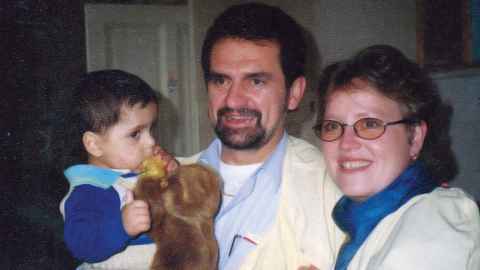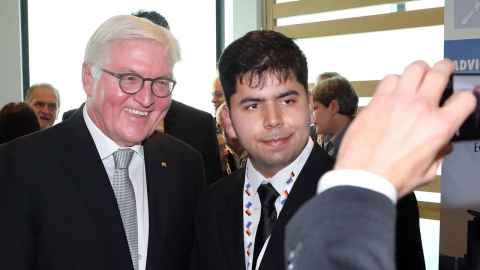When love changes everything
19 October 2018
The love and care of his adoptive parents changed the world for Alex Kuch, but he also gives credit to the University of Auckland, which “opened up so many opportunities” to learn and then to apply the knowledge he has gathered.

The story of Alex Kuch, a recent University of Auckland graduate in Politics and International Relations, begins half a world away in an orphanage in Cluj-Napoca, Romania.
Given the basics of life but deprived of any affection, warmth, stimulation or love, Alex suffered from a condition called hospitalisation.
He habitually rocked, had no language and could not make eye contact with another human being.
His life changed forever when his adoptive parents Heidi and Walter Kuch rescued the 18-month-old and gave him a second chance at life in Germany, later relocating to New Zealand when Alex was 11, attracted by our education system.
“When I met Alex he was very quiet,” Walter says, as he recalls the “basic and overcrowded” institution where some 200 children were housed.
“He had a black mark on his cheek. We were told it was from another child who bit him when he tried to pinch an apple. There was not enough for them to eat so they fought over food. Alex couldn’t walk. Nobody cared for him.”
Walter bundled Alex up and took him to Bucharest for three nights while paperwork was finalised, while his new mother Heidi waited anxiously in Germany for their arrival.
“On the first morning in our hotel he woke up and I dressed him and he started rocking. That was a scary moment, it was a symptom of hospitalisation. We didn’t know if he would recover, but regardless I thought ‘he is our child and I will take him home’.”
After a few weeks in a loving home with responsive parents, the rocking stopped and never came back. But the long-term outlook for Alex was grim. A psychologist advised that he would never lead a normal life, complete high school, or have the social skills to integrate into society.
With the help of intensive speech and fine motor therapy, Alex walked at 22 months and began to talk around the age of five.
This year Alex completed a Bachelor of Arts degree and is now an accomplished public speaker, researcher and adoption advocate.
My parents weren’t going to let a prediction determine who I was going to become.
“My family is really proud of me, especially as I’m the first person in my family to have gone to university. It has been challenging; however the University has been very supportive. I had a writer for exams as I still have some fine motor challenges such as not being able to write neatly and quickly. But coming to university has opened up so many opportunities for me.”
Alex’s full list of achievements is lengthy and constantly growing. Standouts are speaking twice in Romania’s parliament, the first time when only 18 years old, being named a finalist for Young New Zealander of the Year, and completing research looking at the experiences of adoptees.
He is also an advocate for re-opening Romania’s borders to international adoptions. After the overthrow of the Ceau?escu government in 1989, thousands of abandoned children were adopted by overseas families, but corruption was rife and the world’s attention was drawn to the terrible conditions. Romania closed its borders to international adoptions in 2001.
“Just because there have been bad instances, entire countries have closed international adoptions as a result.
It’s like saying just because a small proportion of a population has inflicted violence towards children then everyone should be prevented from having children. What we need is to develop better policies to protect children during the adoption process.”
To this end, Alex is helping to establish a framework for global adoption policies at the third Asia-Europe Foundation Young Leaders Summit on ethical leadership, and will work with other global adoption experts at the International Conference on Adoption Research in 2020 in Milan.

He will also share his joint research with Dr Rhoda Scherman from AUT, which compiles the experiences of other adoptees published on the New Zealand based ‘I’m Adopted’ website.
“I’m Adopted is a place where adoptees from around the world can connect and share their stories,” says Alex. “With the permission of the adoptees, we have gone through dozens of stories to pull together the common themes of what adopted children go through. It’s valuable knowledge for agencies and families, for example knowing when to intervene or what to expect, and to provide better support.”
In an unusual twist in Alex’s own story, he met his birth mother three years ago on a live Romanian talk show.
Alex has visited Romania twice to advocate for reopening international adoptions, but has never sought to connect with his birth parents. While he was speaking on television about his advocacy work, the show’s producers blindsided him by bringing his birth mother and half siblings onto the stage.
“It could have been done more professionally, but things are a bit different over there,” Alex says.
“After I visited some orphanages and was then surprised by my biological family, I began to recall some visual impressions of my time in my orphanage. It was very emotional.”
Alex has chosen not to stay in contact with his birth mother.
“Why would I? I have a mother and father in New Zealand,” he says.
Heidi, his adoptive mother, says there was never an expectation that Alex would attend university. His younger brother Colin, also adopted from Romania two years after Alex, is more hands-on and has started a building apprenticeship.
“Alex just loves to learn. Once he learnt to talk, whoosh, it was like a waterfall that never stopped. He was always asking questions,” Heidi says.
“But we never put pressure on him to go to university. We just supported him in whatever he wanted to do. We didn’t spoil the boys or give them lots of toys, but we spent lots of precious time with them playing games and doing activities as a family.”
But Heidi says Alex was a challenging student and the German schooling system held him back.
“The New Zealand school system has been very good for Alex. When they discovered he was good at maths they pushed him, and then he was away.”
Alex was a top student at KingsWay School, on the Hibiscus Coast where he grew up.
Now back living in Europe, he has begun an internship with children’s rights and development organisation, Aflatoun International, based in the Netherlands. He also plans to return to Romania to continue to advocate for the re-opening of international adoptions, and is writing an autobiography chronicling his journey from the orphanage to New Zealand.
“Alex’s background, interests and experience will help us to scale up our focus on children that are living in alternative care and will have to stand on their own feet as they reach the age of 18,” says Roeland Monasch, director of Aflatoun International. “We want to make sure this specific group of children are empowered with these essential social and financial skills in order for them to be resilient and successful in their adult life. Alex will be a great resource for us.”
By Danelle Clayton
Ingenio: Spring 2018
This article appears in the Spring 2018 edition of Ingenio, the print magazine for alumni and friends of the University of Auckland.